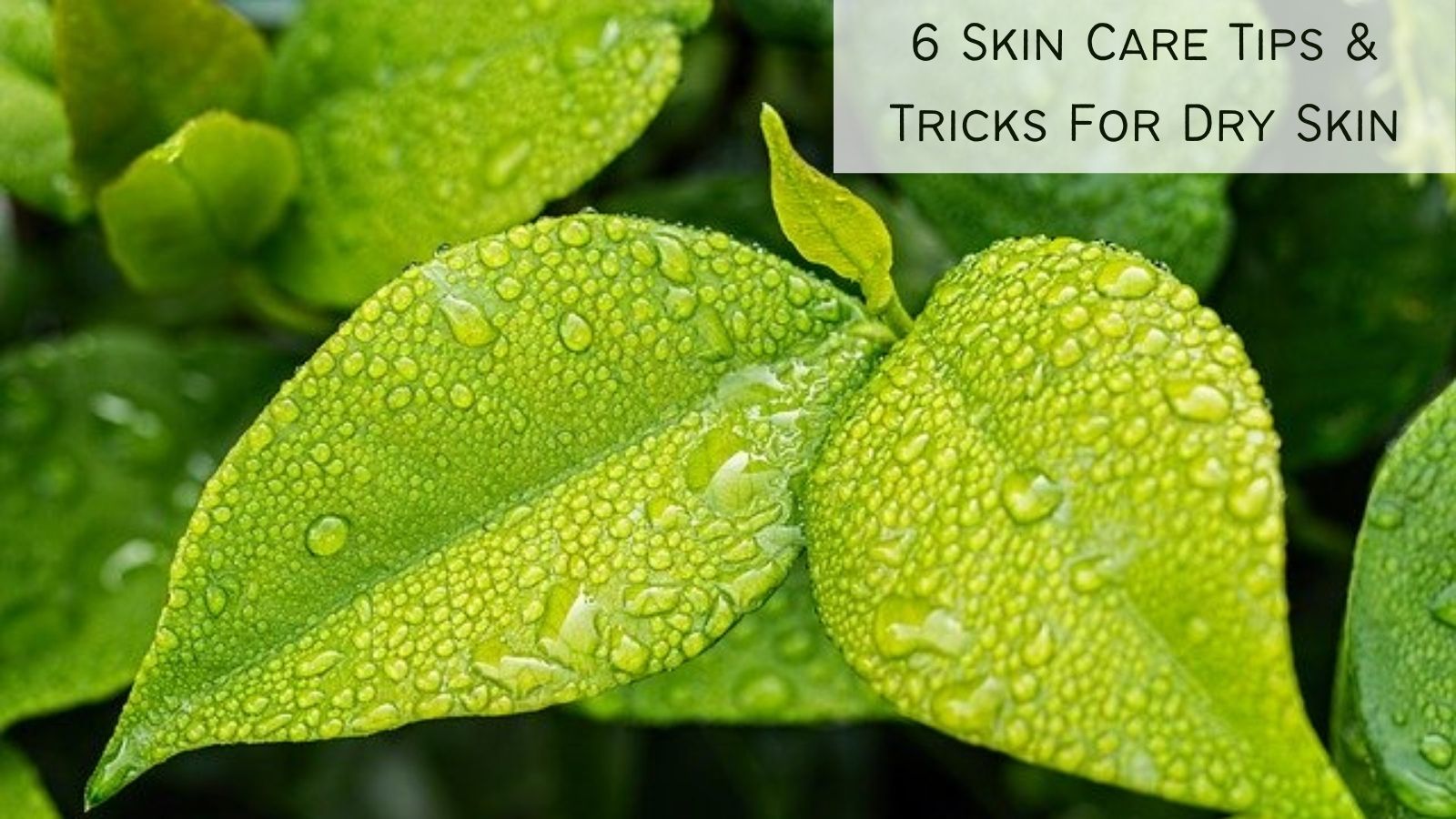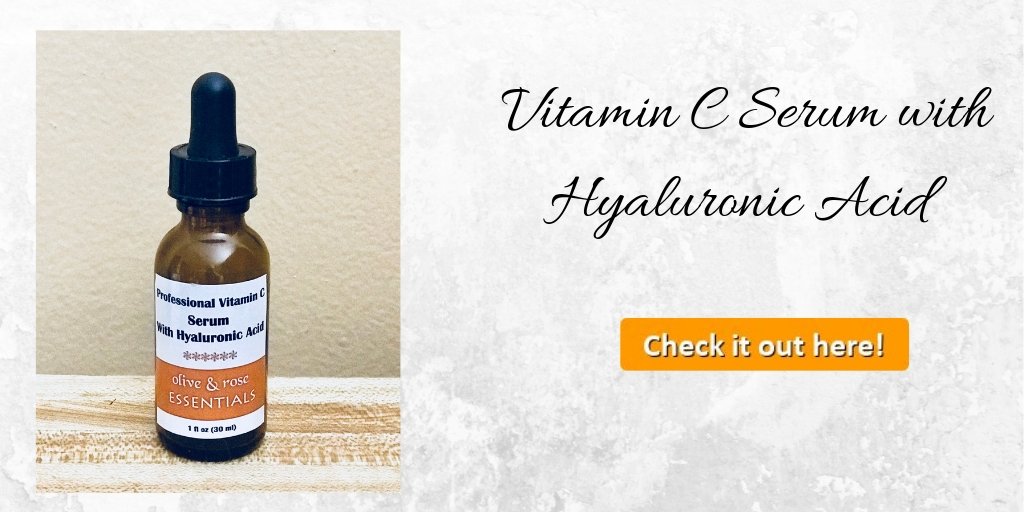The cold, crisp air of winter is certainly invigorating, but it can wreak havoc on your skin. Combine low-humidity levels, with dry, indoor air, and you’ve added insult to injury. Additionally, moisture on your skin evaporates more quickly in cold weather, leaving your skin parched and dehydrated. Check out my 6 skin care tips and tricks to increase your skin’s moisture as the weather cools.

Table of Contents
Skin Care Tips And Tricks For Dry Skin
1. Use a Humidifier
If your skin is dry in the summer, it could become even more dry in the winter. Dry indoor conditions, combined with cold weather, can cause skin to crack and chap. The contrast between these two environments accentuates dry skin.
You can increase the moisture in the air by using a humidifier. Use one in the rooms you spend the most time in, like your bedroom or office. A humidifier is a small machine that controls the degree of humidity in the air.
Here’s a great one. You can also buy indoor plants to boost humidity levels. The water from the plant’s roots circulates through the stems and leaves, evaporating into the air. As an added bonus, some humidifiers double as air purifiers.
Aside from dry skin, an effective humidifier will also keep your sinuses healthy. Dry sinus passages can set you up for congestion, and a greater likelihood of catching a cold or the flu. Lubricated sinuses prevent nosebleeds and may even reduce snoring.
Disclaimer: this post contains affiliate links
2. Drink More Water
What’s happening on the outside of your body, is a reflection of what’s going on internally. Artificially warm indoor air, and warmer clothing, can lead to dehydration in the winter months. Your body’s natural thirst response decreases in cold weather conditions, so you can see why it’s easier to forget to hydrate in the winter.
In the summer it’s easy to hydrate because you’re outside more, and also more active. Your body still needs water even though you don’t feel thirsty. Double up on your efforts to drink more water this winter. Your skin will thank you. As mentioned above, another reason to drink more water in the winter is to keep yourself from getting sick.
[Read More: 3 Benefits Of Drinking Hydrogen Water To Prevent Wrinkles]
Dehydration can result in dried out mucous membranes, in the sinuses and lungs, greatly increasing your chances of catching something. These membranes are barriers against infections so keeping them hydrated boosts immune function.

 3. Don’t Forget To Exfoliate
3. Don’t Forget To Exfoliate
Minimize your exfoliation routine during the winter months. If you typically exfoliate twice a week, reduce that amount in half. If your skin is super dry, once every couple weeks is enough.
Exfoliation is important because it sloughs off dead skin cells, which keeps your complexion glowing. It also makes your moisturizer more effective due to better penetration, and your makeup will glide on more smoothly. So do exfoliate, just not as much!
You may want to switch up your moisturizer during the winter months, and opt for a heavier cream or salve-type moisturizer, rather than a lotion. Moisturizers contain emollients and antioxidants that both hydrate and nourish the skin.
Ideally, you’ll want one that is lightweight enough, to not be greasy, but robust enough to provide long-lasting hydration. This moisturizer contains Manuka honey, along with aloe vera, coconut oil, and shea butter. Manuka honey decreases inflammation in the skin, and has many other benefits as well.
4. Use Hyaluronic Acid
Hyaluronic acid, or HA, is amazing for dry skin because in binds moisture. I make my own HA and vitamin C serum to lock in moisture, and find it really improves the texture of my skin.
HA is good for all skin types, not just dry skin, and it’s particularly amazing for mature skin. Hyaluronic acid is a popular anti-aging skin care ingredient because of its ability to lock in moisture, which declines with age. It also makes the skin more supple and firm.
Plastic surgeons and dermatologists inject HA fillers into wrinkles and sunken areas to boost plumpness. That’s how terrific hyaluronic acid is. For everyday folk, however, HA serums used daily, can smooth and hydrate the skin for a more radiant complexion. Check out this hyaluronic acid moisturizing serum.
[Read More: Hyaluronic Acid [The Ultimate Hydrator]
 5. Take Vitamin D
5. Take Vitamin D
If you haven’t built up your vitamin D stores in the summer months, your levels will most likely be low in the winter. What does this mean when it comes to your skin?
Vitamin D play an important role in the metabolism of skin cells, and is an essential ingredient if your goal is beautiful skin. A deficiency of this crucial vitamin is directly correlated to dry skin, and also impacts skin texture.
[Read More: Can A Vitamin D Deficiency Cause Acne?]
For optimal skin health, make sure your vitamin D levels are in a healthy range. After all, the skin is the organ responsible for converting UVB rays from the sun into this health-giving vitamin.
Get your levels checked, and if they’re low, consider supplementing with 1,000 -2,000 IUs daily, or better yet, eat foods that contain vitamin D. Raw milk and cod liver oil are both great sources. Aim for a vitamin D level of around 50. Here’s a good brand.
6. Drink Less Coffee
If you suffer from acne, rosacea or any inflammatory skin condition, eliminating coffee is a good idea. This can be hard for many people because caffeine is addictive. Coffee can disrupt hormone levels, causing acne, but it can also dehydrate your skin, exacerbating dryness.
Combine your daily cup of coffee with alcohol consumption, and you’ve got a double whammy in terms of dry skin. Add in sugary treats and it’s three strikes you’re out. Caffeine and alcohol are both diuretics, depleting water from the body, and zapping the skin of moisture.
Try an experiment this winter, and eliminate caffeine for three weeks to see if you notice improvements in your skin’s moisture. If you do, you have your answer. You may have to kick your coffee habit or put up with dry skin. Keep in mind, caffeinated sodas dry out the skin as well. I use this coffee alternative.
Key Points
 Cold, dry air can be problematic for those of us with dry skin. Follow these winter skin care tips to reduce the chances of your skin drying out this coming season.
Cold, dry air can be problematic for those of us with dry skin. Follow these winter skin care tips to reduce the chances of your skin drying out this coming season.
Buy a humidifier for your bedroom or office, drink more water, exfoliate less, and use a thick moisturizing cream. Your skin will soak it up! Remember, caffeine is dehydrating so consider decreasing your coffee consumption as well.
Do you have dry skin? Can you offer additional tips and tricks that have helped you? Let me know in the comments:)

Thanks for this informative article. I suffer from dry skin and use a moisturizer which helps. What I didn’t realize is that coffee contributes to having dry skin. This is a problem for me because I love my coffee, but it has given me another reason to wind back on my coffee intake. I will also take up your suggestion of using a humidifier as I was thinking that might help so it was good to see this confirmed in your article.
Yes, a humidifier is a great option, as is a cream-type moisturizer. It’s unfortunate that coffee contributes to dry skin, so cutting back is a good idea. Thank you for reading and taking the time to comment.
I live in a city with a relatively warm climate where the winters go down to no more than about 2-3 degrees Celius at most, but these winter skin care tips still apply. I often get dry flaky skin and chapped lips, and I think I’ll be drinking more water and taking vitamin D could help. You recommended to drink raw milk and take cod liver oil but I’m vegan so those don’t work for me, are there any good vegan sources for vitamin D?
Thanks for commenting Kent. Chapped lips are also an issue in dry weather conditions. You could drink fortified almond milk to get your vitamin D levels up or mushrooms. Kind of random I know. Some tofu is also fortified with vitamin D. Or check out vegan vitamin D supplements.
Thank you for these amazing tips for Winter Dry Skin. My skin is dry all the time so I am going to follow these to the letter. Had never thought of getting a humidifier but will do so for the coming winter. It is high summer here but also very drying. Since we had such a drought I stopped drinking as much water as I once did, but that is now going to become my norm again. What a pity coffee is a no-no.
The tip about changing to a thicker more lubricating face cream works for me.
One of the things I find absolutely essential, winter and summer, is to use a sun protection product under my face cream. The sun does so much damage.
You’re welcome Jill. Do buy a humidifier. I think you’ll be pleasantly surprised what it will do for your skin. I really have to watch my water intake as well, and I commiserate with you about coffee being a no-no. Such a shame caffeine has to be so dehydrating!